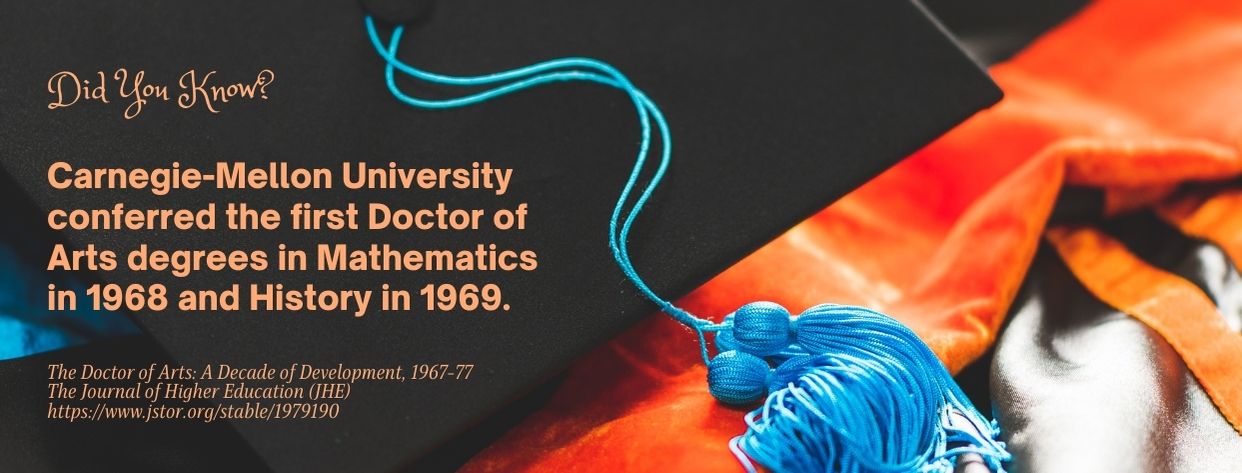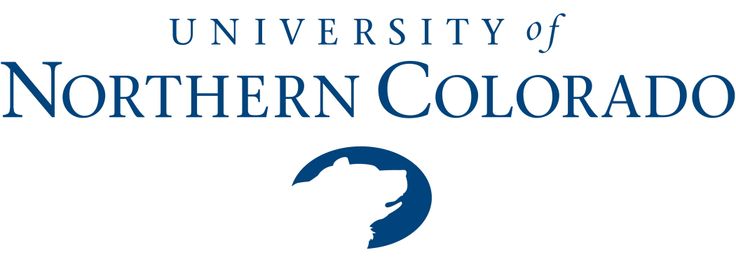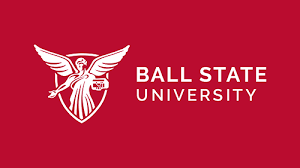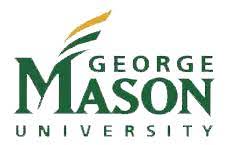The Doctor of Arts (D.A.) degree is both offered on-campus and online across the United States. In the world of graduate studies, a doctor of arts degree is a good alternative for the more rigorous research-based Ph.D.
This particular program is a terminal teaching degree established to provide more extensive training for college and university teaching.

Some schools take the hybrid approach where students can take many courses online but are still required to attend some classes on-campus at a particular time of the day. There are also a few colleges and universities that offer the course 100% online, a perfect method for those who want to advance their education while building their career.
Teaching is a vocation that requires in-depth knowledge of the subject matter and the ability to communicate and impart it to students. If you wish to follow this path, then a D.A. degree in your chosen field can enrich your knowledge and experience.
______________________________
The 5 Best Doctor of Arts (D.A.) Degree Programs
UNIVERSITY OF NORTHERN COLORADO

DOCTOR OF ARTS PROGRAMS IN MUSIC
School Highlights: The University of Northern Colorado offers a Doctor of Arts in Music that has six concentration options and a Doctor of Arts in Music Performance. The general core curriculum allows students the flexibility to explore numerous elective options in arts and music. The Doctor of Arts in Music Performance provides students the opportunity to personalize their approach to meet individual needs and career goals.
The UNC School of Music is internationally renowned for its academic achievements and success, as well as for its impressive doctorate grads. Both doctoral programs and each concentration include major research components that pair students with faculty members. They benefit tremendously from this one-on-one guidance and establish a massive array of networking contacts at UNC.
The Collaborative Piano is suitable for individuals who want to teach college-level music. perform at elite standards, and/or pursue innovative research in music. Learners advanced music history and theory, professional performance techniques, and research methodology.
Individuals interested in becoming college music professors and/or conductors of musical ensembles will thrive in the Conducting concentration! Learners complete 67-71 credit hours including didactic coursework. supervised teaching practicum, and conducting experience. An approved written dissertation and a series of recitals are required for graduation.
The opportunity to collaborate with accomplished composers while also establishing your own composition style is at the heart of the Composition emphasis. Skills that are part of the learning of the 67-credit minimum program include:
- research,
- music pedagogy,
- and advanced composition.
Learners must submit an approved written dissertation and a musical recital of their original compositions to earn the degree, aside from the supervised teaching practicum.
Individuals with the desire to climb the ranks of academia, such as becoming deans of music schools, gravitate toward the Music Education concentration. Learners earn between 66 and 71 credit hours on a wide range of topics, from music literature, composition, and theory to educational leadership. Only a doctoral dissertation is required as a culminating requirement.
The Music History and Literature concentration is also geared toward individuals with ambitions for leadership positions in academia. Learners are provided with plenty of opportunities to collaborate with many of the nation’s prominent music educators and historians.
The program allows its learners a wide leeway in tailoring their educational experiences. A supervised teaching practicum and an original dissertation are among its graduation requirements.
Individuals whose personal passion lies in jazz will find the Jazz Studies emphasis to their liking. Learners work with recognized jazz musicians in the development of their musical skills to the elite level while also getting training as educators, composers, and performers.
Coursework Sample:
- Collaborative Piano
- Composition
- Conducting
- Education
- History and Literature
- Jazz Studies
- Music Performance
Campus Location: Greeley, CO
Accreditation:
- Higher Learning Commission
- Commission on Accreditation of the National Association of Schools of Music
LEARN MORE ABOUT THE UNIVERSITY OF NORTHERN COLORADO’S DOCTOR OF ARTS PROGRAMS IN MUSIC
BALL STATE UNIVERSITY

DOCTOR OF ARTS IN MUSIC
School Highlights: One of the many reasons that make Ball State University’s Doctor of Arts in Music is the concentration option that allows students to personalize their approach in an area outside of music. This curriculum has an overall design that gives students (who choose primary and secondary fields of study) as much education and flexibility as possible.
The primary areas of study include:
- piano chamber music,
- performance,
- theory composition,
- and music education.
The secondary field of study may be chosen from programs in the School of Music or from other departments at Ball State. The choices for the secondary areas of study include:
- entrepreneurial music,
- performance,
- and music history and musicology.
The degree requires an internship, an externship, a dissertation, a comprehensive examination, an oral examination, and teaching pedagogies. The dissertation must be an original work that can be an analytical study, a project with performance or pedagogical elements, or a substantial annotated catalog. Learners may also submit an original piece of music that meets the standards of the university.
Ball State is hugely supportive of all students. For example, the school supplies a huge amount of financial aid opportunities to all Doctor of Arts students, such as the 500 scholarships available to incoming students.
BSU maintains partnerships with 329 employers that are an outstanding resource for students and alumni alike, giving them an excellent standing outside the doctorate.
Learners must meet high expectations since the program enables them to become triple threats – teachers, performers, and scholars. Their elite training takes place in the School of Music’s state-of-the-art recital halls as well as its spacious recording studio space, rehearsal spaces, and teaching studios.
Students are required to register for the regular and summer terms to complete the degree requirements on time. The maximum allowed number of credits for the regular semester is 15 credits and six credits for the summer term. However, the actual number can vary depending on whether a student is a graduate assistant or not – a graduate assistant must register for six credits per semester.
Auditions are conducted for applicants to the performance and conducting programs. Specific audition requirements including video/audio recorded auditions and musical instruments are implemented. Placement tests for applicants to the music history and music theory programs are also required.
Concentration Options:
- Performance
- Piano Chamber Music/Accompanying
- Conducting
- Music Education
- Theory Composition
- Music History and Musicology
- Music Theory and Composition
- Entrepreneurial Music
- Personalized Approach
Campus Location: Muncie, IN
Accreditation:
- Higher Learning Commission
- Commission on Accreditation of the National Association of Schools of Music
LEARN MORE ABOUT BALL STATE UNIVERSITY’S DOCTOR OF ARTS IN MUSIC PROGRAM
GEORGE MASON UNIVERSITY

DOCTOR OF ARTS IN EDUCATIONAL LEADERSHIP
School Highlights: This Doctor of Arts program from George Mason University provides a major in Educational Leadership with an optional concentration in Higher Education. GMU is one of only twenty universities in the nation to offer a degree of this kind.
Candidates must earn 60 credits beyond the master’s degree to earn the doctorate degree. The curriculum is divided into several areas including the 21-credit knowledge area with research design included.
The 18-credit education coursework enables candidates to learn advanced education methodologies and skills in educational leadership. The Community College, College Teaching, and Technology in Higher Education are among the required courses.
The 3-credit research methods and design course prepares candidates for the rigors of the 12-credit dissertation phase. The 6-credit internship experience exposes candidates to the realities of educational leadership at the elite level. There are consortium courses that must be taken at the Consortium of Universities of the Washington Metropolitan Area.
Students can choose from numerous options to create a degree that meets their individual career goals. This educational institution allows students to transfer up to 12 credits from another accredited university or from GMU’s Extended Studies program. All of these facets are excellent indicators of the phenomenal quality of this school and doctoral program.
Note that this is an interdisciplinary program where about 20 knowledge areas within the university participate. Candidates are strongly encouraged to become interdisciplinary thinkers including registering for several courses in a multitude of disciplines.
The colleges that participate in the D.A. in Educational Leadership include the College of Humanities and Social Sciences, College of Science, College of Education and Human Development, and School of Management.
Applicants to the prestigious program must complete the following requirements:
- A master’s degree
- Complete online application
- Non-refundable application fee
- Two official transcripts from all post-secondary institutions attended
- Goals statement
- Three letters of recommendation
- 1,000-word formal writing sample
- GRE scores within five years
If you’re claiming the Virginia in-state tuition rates, you must also submit a completed application pertaining thereto.
GMU also offers a D.A. in Community College Education that prepares candidates for college-level teaching. The curriculum emphasizes higher education pedagogy through coursework that reflects the candidate’s chosen knowledge area. Again, interdisciplinary thinking is strongly encouraged with several colleges and their disciplines to choose from.
Candidates train in four areas of expertise in higher education pedagogy – effective technology integration in the teaching and learning processes; scholarship of teaching and learning; design of programs and curricula including development and evaluation; and active pedagogy. Graduates become respected experts in community colleges and other post-secondary institutions.
Coursework Sample:
- The Community College
- Technology in Higher Education
- The Scholarship of Teaching and Learning
Campus Location: Fairfax, VA
Accreditation:
- Southern Association of Colleges
- National Council for the Accreditation of Teacher Education
LEARN MORE ABOUT ABOUT GEORGE MASON UNIVERSITY’S DOCTOR OF ARTS IN HIGHER EDUCATION PROGRAM
IDAHO STATE UNIVERSITY

DOCTOR OF ARTS IN BIOLOGY
School Highlights: Idaho State University’s Doctor of Arts in Biology was designed and implemented due to an overwhelming desire for a biological sciences degree that is geared toward undergraduate teaching at the college and university level. The curriculum provides an incredibly broad approach to this area of study and heavily emphasizes methods of instruction in biology.
Candidates must be proficient in graduate-level research methodologies and techniques. In this manner, both PhD and D.A. candidates share similar research skill sets but apply them with a different mindset. D.A. candidates use their research skills to improve their teaching skills, particularly the content, method, and delivery of their respective curricula.
Note, however, that the D.A. degree is different from the EdD degree – the former emphasizes teaching methodologies and the interdisciplinary relationships between teaching content. As such, the D.A. degree is suitable for professionals who want to teach in post-secondary educational institutions.
It is a four-year program but allows enough flexibility for some students to complete their studies in as little as two to three years but said time-to-completion is predicated on full-time study and determination. Most students complete the degree requirements in four years – and even then, the time-to-completion may be extended for other reasons.
There are eight outstanding Doctor of Arts fellowship opportunities at Idaho State, and the entire program is funded by support from the first D.A. degree established at Carnegie-Mellon University in 1967. These fellowships are competitive and can be renewed based on satisfactory progress on an annual basis for four years. Fellows receive $12,164 every year and don’t have teaching requirements.
Applicants must have completed a master’s degree that included an independent thesis project in biological research. Other requirements are a minimum of 3.0 GPA for the last two years of undergraduate work and GRE scores in the 35th percentile (minimum) on the quantitative and verbal sections. Admission is obviously on a selective basis.
Coursework Sample:
- Careers in Life Science
- Seminar
- Biometry
Campus Location: Pocatello, ID
Accreditation:
- Northwest Commission on Colleges and Universities
LEARN MORE ABOUT IDAHO STATE UNIVERSITY’S DOCTOR OF ARTS IN BIOLOGY
MURRAY STATE UNIVERSITY

DOCTOR OF ARTS IN ENGLISH PEDAGOGY – ONLINE
School Highlights:
Murray State University offers the Doctor of Arts in English Pedagogy, a program ideal for English teachers at the secondary and post-secondary levels, writers, journalists, researchers, and consultants. Leading to a terminal degree, this DA program is “pedagogically focused” and “disciplinarily centered.”
The core DA in English Pedagogy program features theoretical, methodological, and practical courses focusing on English as a discipline, with these four specializations:
- English Language Specialization
- English Literacy K-Adult Specialization
- English Literature Specialization
- Writing Specialization
There are two program routes that graduate students can choose from:
- The 48-hour Traditional Doctor of Arts program is for master’s degree holders.
- The 72-hour Accelerated Master of Arts to Doctor of Arts program is for bachelor’s degree holders who seek to earn both the MA in English and the DA in English Pedagogy (concentration: Literature). The completion time for this route is faster than earning two graduate programs separately.
The DA in English Pedagogy program at Murray State is offered 100% online with no residency required.
Applicants to this program who are non-native speakers of English must meet the required TOEFL or IELTS score or other English proficiency exam scores. Other evidence of English proficiency may also be considered, including previously earned degrees from higher education institutions that use English as the language of instruction.
Conditional and unconditional requirements for admission apply.
Program Sample:
- Methods of Analysis & Reflection in English Teaching
- Theories of Curriculum Design & Application in English
- Assessment in English
- Instructional Technology for English
Campus Location: Murray, KY
Accreditation:
LEARN MORE ABOUT MURRAY STATE UNIVERSITY’S DOCTOR OF ARTS IN ENGLISH PEDAGOGY.
Frequently Asked Questions
What is a Doctor of Arts degree?
Often considered a pragmatic approach to a doctorate, a doctor of arts degree is the best step for someone who wishes to concentrate and master a particular field of study but with an emphasis on teaching it. It is an academic degree of the highest level. A Doctor of Arts degree is also conferred as an honorary degree with the added designation of honoris causa.
Unlike a traditional Ph.D., it requires less research. Instead, most D.A. degrees revolve around teaching internships, teaching methods, and curriculum design coursework. It is instrumental in equipping scholars with the necessary breadth and diversity to become teachers in their chosen fields.
But while it is usually described as a “teaching doctorate,” a D.A. degree is not the same as a Doctor of Education degree which is more concerned with issues in education and a theoretical and practical preparation in pedagogy.
Most Doctors of Arts degree programs include a concentration in music, history, or literature. There are also D.A. degree programs that focus on political science, mathematics, economics, biology English, chemistry, and physical education.
In general, Doctor of Arts programs provide extensive training in pedagogy, with the goal of demonstrating a variety of pedagogical techniques and skills. Doctor of Arts students are also expected to craft a distinct teaching philosophy.
How do I earn my Doctor of Arts degree?
Aspiring Doctor of Arts students must file an application to the graduate school of their choice where the said degree program is offered. Most D.A. degree programs require applicants to acquire a master’s degree from an accredited college or university. Some stipulate a specific cumulative GPA, usually of 3.00 or better. Application forms are generally available online. Students may be asked to give a non-refundable application fee.
Some of the additional requirements include an official transcript of records from universities or colleges where they earned their bachelor’s and master’s degrees.
In specific fields like music, performance, and auditions are required. Schools often have a list of accepted instruments for an audition so checking their websites can make your application for admission easier.
Once admitted, students are taught and trained in several areas including college-level teaching, research, and the specific field of their study. Aside from the coursework, students need to complete a thesis (usually around 50,000-80,000 words). Generally, the thesis for Doctor of Arts candidates is focused on questions of professional practice. For example, a D.A. in social sciences degree program tackles policy analysis and advice.
A thesis requirement can be replaced by a significant creative project. It can be a novel, biography, memoir, poetic work, play, or video work.
Do I need a Doctor of Arts degree to work in the academe?
The short answer is yes. This degree is especially valuable if you want to be prepared for faculty positions within higher education. It makes a strong impression on hiring committees. A D.A. degree provides hands-on experience as a college teacher, preparing students to acquire a well-rounded set of professional skills.
What career paths do graduates in Doctor of Arts usually take?
The most common career path for Doctor of Arts degree programs is in the academe. Holding a teaching position in colleges and universities is made easier with acquired teaching skills in a particular field that few faculty candidates possess. D.A. degree holders can also work in industries that require research and writing skills in one specific area of study. They can become scholars in their fields.
D.A. programs prepare graduates for their essential role in developing and enhancing departmental programs that help mentor students and faculty when it comes to disciplinary teaching and learning. D.A. graduates take up faculty and leadership positions in higher education, filling a niche that Ph.D. graduates cannot fulfill.
What salary range can I expect with my Doctor of Arts degree?
Doctor of Arts degree holders who enter the world of academia usually receive an average salary of $34,000 to $70,000 a year, excluding bonuses. Their pay can vary depending on the institution where they teach, whether it is in public or private colleges and universities. Their salary can also depend on their area of expertise. Music teachers can earn as much as $93,440 per year.
Other faculty positions that D.A. degree holders can explore include curriculum advisor and curriculum developer. These positions require specialized knowledge of their particular field of study with a median salary of $60,510.
What schools offer online and traditional Doctor of Arts programs?
Numerous colleges and universities are offering the Doctor of Arts program on-campus. It includes the University of Northern Colorado, Ball State University in Indiana, George Mason University in Virginia, and Idaho State University. In Pennsylvania, Holy State University offers the program online.
When seeking to advance your career and expertise in higher education, earning a Doctor of Arts degree is something you will not regret. It will not only ensure your competitiveness when it comes to employment, but this degree program will also help shape you into a scholar of your chosen field, deepening and expanding your knowledge and skills in a particular area of study with the aim of applying it in pedagogy.
How versatile is a Doctor of Arts degree?
A Doctor of Arts degree is an interdisciplinary degree that can be quite versatile. The specific program will depend on the institution, but some common curricula can include courses in professional writing, research and communication, intercultural studies, digital media, creative writing, and literature.
With the potential to specialize in a variety of topics, professionals with a Doctor of Arts degree may be able to pursue a range of careers in academia, media, business, policy-making, and more.
Additional Information:
- The Best Doctor of Architecture (D.Arch.) Degree Programs
- Art and Design: Art Student’s Glossary
- Crash Course: Liberal Arts
